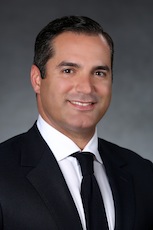BLOG
 Firm shareholder Roberto C. Blanch wrote an article that appears in the op-ed “Opinions” page of today’s Miami Herald pegged to the ongoing investigative series by el Nuevo Herald that is being featured in the Herald. The article, which was titled “Florida Must Improve Policing of Condo Fraud,” focuses on the need for changes in the state law enforcement and government’s collective mindset towards combating condominium association fraud.
Firm shareholder Roberto C. Blanch wrote an article that appears in the op-ed “Opinions” page of today’s Miami Herald pegged to the ongoing investigative series by el Nuevo Herald that is being featured in the Herald. The article, which was titled “Florida Must Improve Policing of Condo Fraud,” focuses on the need for changes in the state law enforcement and government’s collective mindset towards combating condominium association fraud.
Roberto’s article reads:
An investigative report in el Nuevo Herald chronicled the growing problem of election fraud at South Florida condominium associations. Based on the episodes of possible fraud uncovered by the reporters and the growing number of complaints by local condo associations, it has become apparent that it’s time to put teeth into Florida’s laws and enforcement actions addressing this type of fraud.
The report uncovered that at least 84 signatures were forged in fraudulent ballots submitted in the annual board member election last year at The Beach Club at Fontainebleau Park condominium in northwest Miami-Dade. It also describes how the election at the Los Sueños condo in Hialeah was anything but a dream when it resulted in an unprecedented voter turnout of 115 percent after the final vote tally exceeded the total voting pool.
The boards of directors control the purse strings for the communities they govern, and many communities have annual budgets of multiple millions of dollars that are used for a variety of lucrative service contracts. As such, condo association boards make for appealing targets for fraudsters who conspire to take over their control via annual elections.
In a recent case in Las Vegas, a U.S. Justice Department investigation revealed that 11 associations were defrauded of tens of millions of dollars in a board of directors takeover scheme from 2003 to 2009. Forty-one defendants were convicted of getting their straw unit buyers elected to the associations’ boards through tactics involving forgery, bribery, ballot stuffing and dirty tricks. The conspirators were found to have rigged the associations’ elections by traveling to Mexico to print phony ballots, using the master key at a condominium complex in order to remove ballots from mailboxes, and retrieving discarded ballots from condo dumpsters.
South Florida’s propensity for high-end luxury condos owned by investors who primarily reside elsewhere and do not participate in their annual board member elections make the area’s thousands of associations with massive operating budgets ideal targets for takeover schemes.
Even if special attention is given by association members to help ensure that all of the applicable laws are followed, it has become impossible to prevent the most brazen and savvy fraudsters from prevailing in their takeover schemes.
The Miami Herald article reported: “Local police agencies say that most of the complaints do not involve criminal activities and can be handled in civil courts. Prosecutors say police or the [Florida Department of Business and Professional Regulation (DBPR)] are responsible for enforcing the laws, but the state agency argues that it cannot investigate complaints about actions that fall outside its jurisdiction or that lack sufficient evidence.”
Florida is the state with the most community associations in the country, with more than 47,000, and it has now become imperative for the state’s lawmakers, regulators and law enforcement agencies to change their collective mindset in their approach toward combating community association fraud, theft and embezzlement.
The millions of Florida residents who live in properties with community associations should raise their voices in a call for the state to enhance the authority and resources of both the DBPR and the white collar crime units of the state attorney’s offices. They should also demand stricter penalties and tougher laws against this type of fraud, and should work closely with the state’s regulators and law enforcement to help ensure that their investigations and enforcement actions are as effective as possible.
South Florida, and in particular Miami, has earned a reputation as a hotbed for imaginative and inventive fraud schemes that strain credulity. If major changes do not take place in the state’s approach to preventing and prosecuting community association fraud, we will undoubtedly soon be adding these condominium board takeovers to the inglorious list of the schemes that have contributed to our ignominious reputation.
Our firm congratulates Roberto for sharing his insights into this important topic that is now receiving considerable attention from the Miami Herald with the newspaper’s readers.

